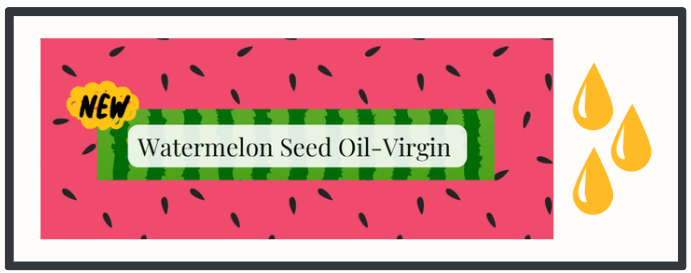Jedwards is excited to offer Unrefined (Virgin) Watermelon Seed Oil, our item #S1648!


Across the world, watermelon has long-been a symbol of refreshment, family gatherings, and celebration. Who among us in their early years has not faced the harrowing thought that a vine is already growing within us?
As adults, we of course know that watermelon seeds are perfectly safe to eat. In fact, they’re packed with nutrients, including protein, healthy fats, and essential minerals. Far from being just an inconvenience to spit out, they are a popular snack in many parts of the world. In countries such as China, Nigeria, and Egypt, watermelon seeds are often roasted, salted, and eaten much like sunflower seeds. In Africa, where watermelon originated as a desert dwelling plant, the seeds have long been used for flour-making as well as a source of precious oil. Citrullus Vulgaris is the cultivated watermelon we are familiar with in the US and is 1 of 7 of the Citrullus species currently known.
While the watermelon fruit is hydrating to the body, the seed oil is hydrating for the skin! It is rich in linoleic acid (a polyunsaturated fat) and contains oleic acid (omega-9), palmitic acid, as well as vitamin E. Due to its composition, it is quickly absorbed into the hair & skin without clogging pores or leaving the wearer with a greasy residue. For this reason, it is favored in lotions and light-weight body butters, as well as facial creams targeting oily skin. It is well regarded by formulators for its subtle aroma and pale-yellow hue, making it a versatile addition to a formulation. It is also very gentle and considered suitable for those with sensitive skin.



Outside of the cosmetic industry, watermelon seed oil is used in the nutraceutical realm as a supplement valued for its essential fatty acid and antioxidant content. Due to its delicate nutty flavor profile and beneficial properties, it may be used in the food industry as an ingredient in gourmet salad-dressings. With a smoke point comparable to grape seed oil, watermelon oil finds use in frying and cooking applications in African and Middle Eastern countries.
The popularity of plant-extracted oils has grown exponentially over the years, resulting in a search for less well-known sources. Watermelon, with its versatility and beneficial qualities, is proving to be more than just a seasonal treat but instead something we can benefit from year-round! Since watermelon plants can send deep roots into the ground, allowing them efficient access to water, and are considered a high-yield crop per acre, they may be an increasingly viable resource for seed oil. Not only this, but watermelon is a prime example of a zero-waste crop, where multiple parts—fruit, rind, and seeds—can be utilized for food, cosmetics, and agricultural byproducts. The oil, once an overlooked byproduct, is now gaining recognition for its characteristic benefits, aligning with modern trends in sustainability and natural skincare. As consumer awareness of plant-based multi-functional ingredients continues to rise, it is highly likely watermelon seed oil will find a more prominent place in the culinary realm the same way it has grown in popularity for skincare formulations. Only time will tell if this remarkable plant continues to establish itself in popular culture as more than just a favorite hydrating snack, but its potential is certainly ripe for exploration!






